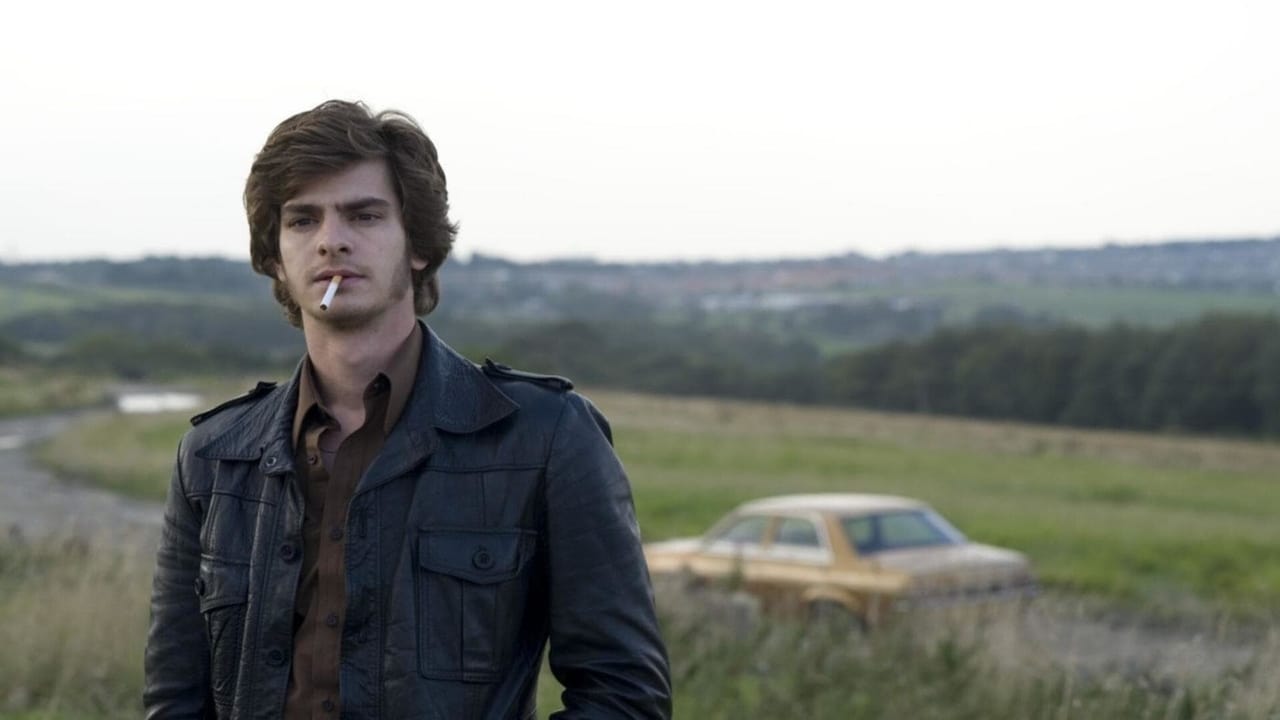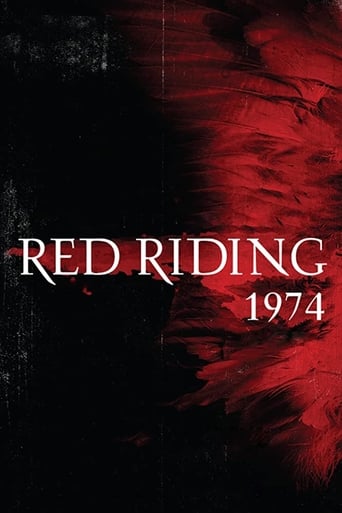

Vicious, disgusting, more than gory, just gross, and yet so true to "life" if this is life. It sure is Yorkshire, accent, desolation and misery (more than plain and simple poverty), cruelty, pollution, greed, vice, perversion, etc. spread all over. All evils in one pouch, one bag in West Yorkshire and the motto that "this is the north, where we do what we want," that's the great beauty of ugliness.It will take you three long episodes to reach the culprit and you won't be surprised at all when you finally come to him. In the meantime the police would have revealed itself the most odious, ferocious and mentally cannibalistic institution you can imagine. Asking a question for them is necessarily hurting, torturing and a few other things of the sort: breaking fingers, crushing burning cigarettes anywhere you can imagine, stripping the suspects naked, and the films do not show them naked (prudes!). There is not one single person in the police force that is able to do anything regular like find a culprit that is really guilty and bring that one to justice. One journalist is driven to craziness and some deadly justice enforcing spree, and yet you will know if he was right in his choice of targets at the end of the third film. Another young man, slightly spaced out will be convinced under duress by everyone, probably only in the police, that he killed the girl. And he will end his life in prison. With little chance to be retried since he signed a confession and pleaded guilty.And quite a few are questioned that way and yet the crimes are going on: kidnapped girls, then raped, and in many ways cut up and carved up and more or less endowed with wings and feathers. And all that in a society that is rotten to the core, that speculates on the death of as many people as possible with pollution and the exploitation of them as long as they live with projects that are as crazy as they are greedy of shopping malls with cinemas and all kinds of entertainments to empty the billfolds of the gullible submissive slaves of the public till they are empty and they can then commit suicide or die young of any kind of hazardous escaping tentative or industrial pollution. And for the girls and women prostitution and promiscuity are the main two udders of everyday suspended death. You can imagine what the other two are.And be sure that all the cadres of the police and the most respected people in this society, lay and clerical, are among the small circle of speculators and their only aim is to make money and thus to keep the surrounding society going because you cannot squeeze money out of marginal miserable derelict and impoverished proletariat. No matter what, they must have just a little bit more than their basic needs to be able to spend that little bit more in the traps of the entertaining plotters.Is it a great trilogy? I do not know but one thing is sure even if at the end the killer is finally put out of the way all the corrupted elite of this part of Yorkshire will not be in any way even questioned, not to speak of prosecuted. After all corruption is the basic human dimension: the survival instinct of the more corrupted declared the fitter, by all means, even selling their parents into slavery and feeding their own children to the industrial sharks of our certainly not post-modern society but definitely pre-modern jungle.Dr Jacques COULARDEAU
... View MoreA rookie Yorkshire journalist (Andrew Garfield) sets out to solve the case of a child murderer.I'm a sucker for good journalism movies, and I think this one is especially strong. Garfield is a great actor, and the 1970s setting adds something more to the story. I was not familiar with the director before this, but now I may have to keep my eyes open for his future projects... this could be the best in the trilogy.What I love about good journalism stories, this one included, is that they operate like detective stories... but the rules are more flexible. Journalists need not do everything by the book, and can sometimes go places a detective would never go... at least not in uniform. Can this journalist uncover the truth?
... View MoreEnglish television and film director Julian Jarrold's television film which was written by English screenwriter, producer and director Toni Grisoni, is the first of three adaptations of English writer David Peace's Red Riding Quartet (1999-2002) and was succeeded by "Red Riding 1980" and "Red Riding 1983". It was screened at the Melbourne International Film Festival in 2009 and at the 36th Telluride Film Festival in 2009, was shot on location in West Yorkshire and Leeds independent studios in Northern England and is a British production by Revelation Films which was produced by producer Andrew Heaton, producer Anita Overland and producer and casting director Wendy Brazington. It tell the story about Edward Dunford, a young journalist who returns from the south after his father has passed away. Edward is looking to become a crime correspondent and shortly after a 10-year-old girl named Clare Kemplay has disappeared on her way home from school, he begins his trial period at the Yorkshire post and is given one month to prove himself by assistant chief constable Bill Molloy. As Edward gets further into the investigation of the disappearance he is warned by his friend Barry about a local construction magnate named John Dawson and meets Paula Garland who is the mother of one of the missing girls. Finely and acutely directed by English filmmaker Julian Jarrold, this fast-paced fictional tale which is narrated mostly from the protagonist's point of view, draws a riveting portrayal of an ambitious reporter who is drawn into a world of high level corruption during his first assignment for a local newspaper and his relationship with a secretive woman. While notable for it's naturalistic milieu depictions, fine cinematography by cinematographer Rob Hardy, production design by production designer Cristina Casali and editing by film editor Andrew Hulme, this character-driven and narrative-driven psychological thriller depicts a dense study of character and contains a great score by British musician and composer Adrian Johnston.This poignantly and forebodingly atmospheric, darkly humorous, unsentimental and somewhat romantic neo-noir which is set against the backdrop of West Yorkshire in 1974, is impelled and reinforced by it's fragmented narrative structure, subtle character development, various characters, interrelated stories, multiple viewpoints and the prominent acting performances by British actors Andrew Garfield, Rebecca Hall, Sean Bean and Eddie Marsan from the great ensemble cast. A multifaceted and consistently suspenseful mystery.
... View More'RED RIDING': Three and a Half Stars (Out of Five) Three part UK TV adaptation of author David Peace's quartet of books published from 1999 to 2002. The stories center around serial murders, missing children and most prominently police corruption. They feature several recurring characters which play minor supporting parts in some chapters and much bigger and more developed roles in others. The cast features the likes of Andrew Garfield, David Morrissey, Paddy Considine, Mark Addy, Sean Bean, Rebecca Hall and many others. The films were written by Tony Grisoni and directed by Julian Jarrold, James Marsh and Anand Tucker (each directing an individual chapter). They were released on UK television in March 2009 and theatrically in the US in February of 2010.The films are each titled 'RED RIDING: IN THE YEAR OF OUR LORD...' and the year that each chapter is set in (1974, 1980 and 1983, they exclude the second book set in 1977). The first film stars Garfield as an arrogant reporter, named Eddie Dunford, who takes on an assignment for the Yorkshire Post investigating the disappearance of missing girls. He butts heads with a local businessman, named John Dawson (Bean), as well as the dirty police Dawson's involved with. He escalates his investigation to dangerous levels that eventually put his life as well as others close to him in danger. The second chapter centers around a police officer, named Peter Hunter (Considine), assigned to head up the Yorkshire Ripper murders investigation. Flashbacks are drawn to the first film, which help further explain it as well as this installment, and the story again all revolves around corrupt officers of the law which Hunter of course comes into conflict with. The final episode revolves around a supporting player from the first two films named Maurice Jobson (Morrissey), a corrupt police officer who has to deal greatly with his conscience, in this chapter, for his involvement in the crimes from previous episodes. It also focuses on a naive public solicitor (Addy) who comes to the defense of a wrongfully convicted mentally handicap young man (from previous story-lines).The films jump around a lot from present day to flashbacks without explanation, which make them very hard to differentiate (at least at first). They also move between several different story-lines rapidly and from key characters to others frequently without taking the time to allow the viewer to adjust. Besides these flaws the audio is horrible, making a large amount of dialogue very hard to comprehend, and the pacing is sometimes almost non existent. As you can tell the films are far from perfect and often leave the viewer lost, bored (as a result) and aggravated. Despite this they are beautifully shot, compelling at times and involving to a certain extent. They'll leave many desiring repeat viewings (multiple I'm sure, just to fully understand them) which is a compliment, even though they brought on the urge for this desire to begin with. Even when you don't know what's going on (which is very frequently) you can tell that it's something that could be very interesting and entertaining. There's a lot of potential here for some great entertainment but it's obviously poorly handled on so many different levels. A truly great missed opportunity.Watch our review show 'MOVIE TALK' at: http://www.youtube.com/watch?v=eS7EjRs-tOE
... View More